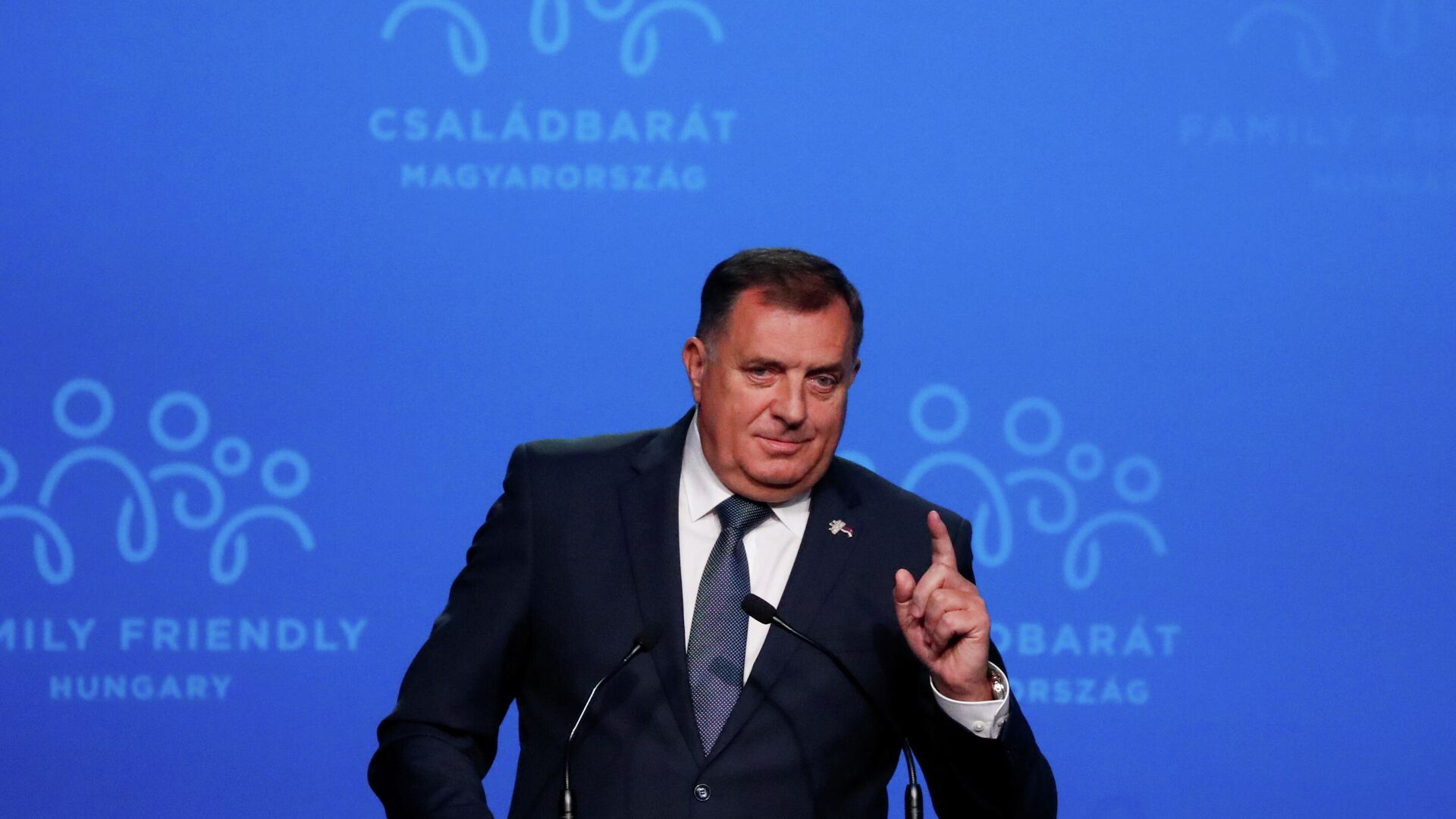https://sputnikglobe.com/20210928/bosnian-serb-leader-says-republika-srpska-may-form-own-army-1089495562.html
Bosnian Serb Leader Says Republika Srpska May Form Own Army
Bosnian Serb Leader Says Republika Srpska May Form Own Army
Sputnik International
BELGRADE (Sputnik) - The Republika Srpska will revoke its consent to have a joint military with Bosnia and Herzegovina (BiH), and consider the possibility of... 28.09.2021, Sputnik International
2021-09-28T20:06+0000
2021-09-28T20:06+0000
2021-09-28T20:06+0000
bosnia and herzegovina
army
genocide
milorad dodik
republika srpska
https://cdn1.img.sputnikglobe.com/img/07e5/09/1c/1089495534_0:78:2897:1708_1920x0_80_0_0_010a2c6a21dff8b556697caf39af32da.jpg
Currently, the autonomous regions of the BiH share several common bodies, including the military and the foreign ministry. However, relations between official Sarajevo and Bosnian Serbs in Banja Luka, the capital of the Republika Srpska, have deteriorated in the past few months over the adoption of amendments to the country's criminal code that criminalize denial of the 1995 genocide in Srebrenica.In the coming days, the authorities will also make a decision regarding the formation of the army of the Republika Srpska, which can be done within few months after revoking the joint army deal under the constitution, he added.Dodik further urged the members of the Republika Srpska parliament to show a unified stance on the matter.In July, then-top international envoy observing the implementation of the peace agreement that ended Bosnian war, Valentin Inzko, set jail terms of up to five years in the BiH criminal code for anyone who publicly denies, or tries to justify, the Srebrenica genocide.The leadership of Serbia and the Republika Srpska, in turn, recognize that the massacre of Bosnian Muslims in Srebrenica was a war crime committed by certain individuals, but deny the term "genocide" and the involvement of the entire Serb people in it.Following the dissolution of Yugoslavia in 1992, Bosnia and Herzegovina proclaimed independence and the Bosnian War erupted between Bosnian Muslims, Serbs and Croatians. The war was put to an end by the 1995 Dayton Agreement, which formed two autonomous entities within BiH – the Republika Srpska and the Federation of Bosnia and Herzegovina — governed by a collective presidency that is formed by three members representing the country's Bosnian, Croatian and Serbian populations. The state is headed by one of the presidency's members on a rotational basis.
bosnia and herzegovina
republika srpska
Sputnik International
feedback@sputniknews.com
+74956456601
MIA „Rossiya Segodnya“
2021
Sputnik International
feedback@sputniknews.com
+74956456601
MIA „Rossiya Segodnya“
News
en_EN
Sputnik International
feedback@sputniknews.com
+74956456601
MIA „Rossiya Segodnya“
Sputnik International
feedback@sputniknews.com
+74956456601
MIA „Rossiya Segodnya“
bosnia and herzegovina, army, genocide, milorad dodik, republika srpska
bosnia and herzegovina, army, genocide, milorad dodik, republika srpska
Bosnian Serb Leader Says Republika Srpska May Form Own Army
BELGRADE (Sputnik) - The Republika Srpska will revoke its consent to have a joint military with Bosnia and Herzegovina (BiH), and consider the possibility of forming its own army, Milorad Dodik, Serb member of the BiH presidency, said Tuesday.
Currently, the autonomous regions of the BiH share several common bodies, including the military and the foreign ministry. However, relations between official Sarajevo and Bosnian Serbs in Banja Luka, the capital of the Republika Srpska, have deteriorated in the past few months over the adoption of amendments to the country's criminal code that criminalize denial of the
1995 genocide in Srebrenica.
"These days we are assessing everything that has been done by the Office of High Representative in BiH or through the agreements we have signed. We will withdraw our agreements on the joint army and on the High Judicial and Prosecutorial Council," Dodik told the Radio Television of Republika Srpska.
In the coming days, the authorities will also make a decision regarding the formation of the army of the Republika Srpska, which can be done within few months after revoking the joint army deal under the constitution, he added.
Dodik further urged the members of the Republika Srpska parliament to show a unified stance on the matter.
In July, then-top international envoy observing the implementation of the peace agreement that ended Bosnian war, Valentin Inzko, set jail terms of up to five years in the BiH criminal code for anyone who publicly denies, or tries to justify, the Srebrenica genocide.
The leadership of Serbia and the Republika Srpska, in turn, recognize that the massacre of Bosnian Muslims in Srebrenica was a war crime committed by certain individuals, but deny the term "genocide" and the involvement of the entire Serb people in it.
Following the dissolution of Yugoslavia in 1992, Bosnia and Herzegovina proclaimed independence and the Bosnian War erupted between Bosnian Muslims, Serbs and Croatians. The war was put to an end by the 1995 Dayton Agreement, which formed two autonomous entities within BiH – the Republika Srpska and the Federation of Bosnia and Herzegovina — governed by a collective presidency that is formed by three members representing the country's Bosnian, Croatian and Serbian populations. The state is headed by one of the presidency's members on a rotational basis.

